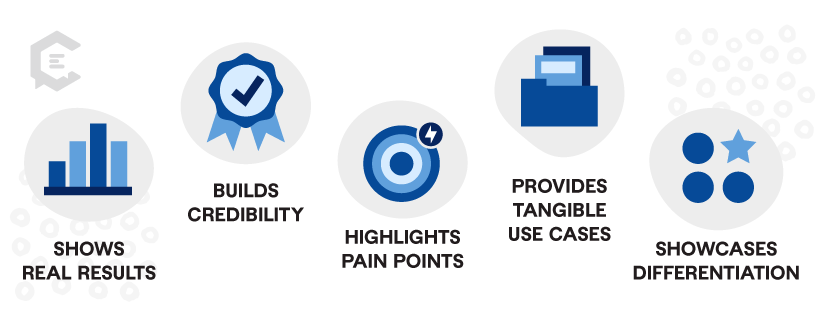Think about how many times you’ve made a purchase because of a recommendation.
It could be from a friend or even an influencer online. With SaaS companies, it’s a little harder to get buyer reviews on social media — but they can invest in case studies.
For cloud computing companies especially, case studies serve as a powerful marketing tool. Your customer success stories provide evidence, build trust, and address customer concerns all in one fell swoop.
In this article, we’ll dive into everything about cloud computing content marketing case studies. We’ll talk about why they’re important, their benefits, and some of the best examples out there.
After this, you’ll be leveraging the power of case studies in no time.
The Importance of Case Studies in Cloud Computing Content Marketing
Because most SaaS buyers are data-minded, building trust and demonstrating real-world results is key. That is why case studies are an effective form of Tech and SaaS content marketing when you want to reach cloud computing companies.
Case studies help cloud computing content marketing efforts by:
- Showing real results: Case studies show how your company benefits customers. They showcase practical applications and outcomes in the real world.
- Building credibility: Customers trust cloud providers with critical data and operations. Case studies help establish trust by showing how real clients achieved positive results.
- Highlight pain points: Case studies often highlight challenges or pain points. A successful case study shows real applications of your service solving a problem.
- Providing tangible use cases: Case studies offer concrete examples of cloud computing applications across industries and scenarios, helping more customers see potential uses.
- Showcasing differentiation: A case study is an opportunity to stand out. While cloud services may seem the same, a case study can highlight your key differentiators.
How to Leverage Case Studies and Success Stories in Content Marketing
A case study tells the story of how real customers use your cloud computing service. These customer stories can be delivered as easily accessible on-page copy (think blogs), downloadable PDFs behind a gate, or single sales sheets distributed by your internal team.
The basic case study template
There is a formula for writing case studies that use a three-part structure:
- The challenge: Describe the problem your customer needs to solve
- The solution: Show how your service helped the customer overcome their pain point
- The results: Analyze the impact to demonstrate your solution made a difference
This narrative framing can help prospects actually envision how your service will transform their business.
Choose relevant stories
When creating case studies for cloud computing services, choosing the right characters is important. Look for customer stories that showcase the value and impact of your services. When looking for the right stories to tell, consider the following:
- Your target audience’s needs
- Diverse or interesting use cases
- Measurable results
- Unique and innovative approaches
- Geographic and industry relevance
- Current industry news and trends
- The relationship with the client
Most importantly, choose authentic stories that genuinely reflect your customers’ experiences. Avoid exaggerations or embellishments. Authentic case studies build trust and credibility with potential customers.
Craft a compelling narrative
Case studies are stories — they should have a beginning and end. A good case study starts with an introduction to your client. This is a customer story, so use the top portion of your case study to talk about the user, not yourself.
Then, like any good story, introduce some conflict. Use specific examples of how their system was not working and how that affected their desired outcome. Was downtime causing real trouble? Did another solution come at too high of a cost? Expand on why it wasn’t worth it.
Finally, explain your solution. Use real terms of how a customer used your cloud service to solve problems. Remember, narrative storytelling is one of the best ways you can connect with your audience, especially in a technical jargon-heavy space like cloud computing.
Amplify distribution
While some users will find your case studies organically, you should always look at content distribution and promotion strategies. Some ways to distribute your case study include:
- Publish it to your website or blog
- Share it within external email newsletters with stakeholders
- Provide copies to your sales team
- Post it to your social media accounts
Track the engagement and effectiveness of your case study distribution using analytics, website metrics, and feedback from sales teams.
And if you end up needing help, outsourcing your B2B SaaS content creation can be a great way to maximize your impact cost-effectively.
Benefits of Using Case Studies and Success Stories in Cloud Computing Content Marketing
All in all, case studies showcase your expertise, thought leadership, and ability to deliver on your promises. They highlight how your company is an effective and reliable partner and ultimately generate warm leads for your sales team.
Let’s break down the benefits even more:
Demonstrating product value
A case study provides a comprehensive and persuasive illustration of your value proposition. It should showcase your product’s ability to address specific challenges and meet customers’ needs. By delivering tangible results, a case study can show — not tell — how your product provides value.
Building brand trust
A case study serves as a transparent and authentic showcase of real-world experiences. Potential customers can see how you have addressed similar pain points. This relatability fosters trust. A reader can envision themselves achieving similar results.
Moreover, a well-crafted case study includes measurable results and quantifiable benefits. This data-driven approach enhances trust by providing objective evidence of your product’s impact. Tangible numbers like increased revenue, cost savings, or improved efficiency show the real value of your service.
Driving customer engagement and conversions
Case studies fall into bottom-of-the-funnel marketing, meaning they’re a piece of content that comes closer to a decision. Case studies are an incredible asset in dealing with clients who don’t want to be the first to try new offerings. If someone else has “gone first,” it takes away some of the perceived risks.
Examples of Successful Case Studies in Cloud Computing Content Marketing
What article about case studies would be complete without a few case studies? Successful case studies should be easy to understand, compelling, and full of character. Here are two examples that fit the bill:
Deloitte: A global cloud integration on an aggressive schedule
This case study by Deloitte is a great example of differentiation. A global chemical company worked with Deloitte on a multiyear integration program. Deloitte conducted an integration platform as a service (iPaaS) vendor assessment and eventually decided to move forward with Microsoft Azure Integration Services.
While the story highlights cloud services, it also emphasizes the quick timeline. While other companies may be able to provide the same cloud services, Deloitte delivered ahead of schedule.
Accenture: Carlsberg brews innovation with cloud
This case study by Accenture features an interesting customer and use case. While not everyone would make the connection between beer and cloud computing, Accenture creates a great case study to help you think outside the box. What’s more, this project was completely custom, showcasing one-of-a-kind technology.
Embracing Case Studies and Success Stories in Your Content Marketing
Bottom line, content marketing case studies are a persuasive marketing tool that can increase conversions and strengthen your brand. They build trust, convert customers, and provide tangible evidence of your company’s value propositions.
If you want help telling your customers’ stories, ClearVoice has you covered. We have a large network of tip-tier Tech and SaaS writers with the expertise and experience to help you make a great case study. Talk to a content specialist today to get started.








